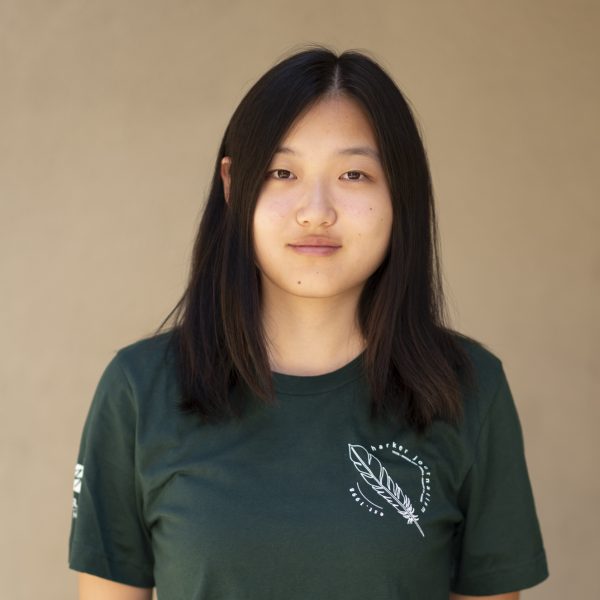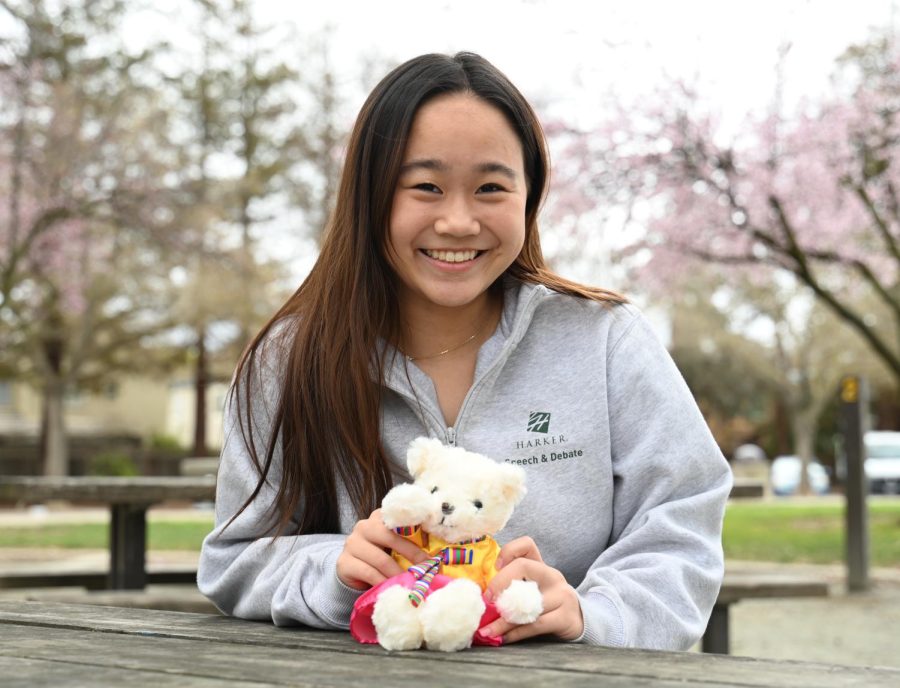Humans of Harker: Narration with nuance
Michelle Jin takes an open-minded approach to addressing world issues
“When I went to Korea and came back, it really made me recognize, in the U.S., a lot of the troubles that we faced in the past few years are because people are becoming more individualistic and too focused on ‘me’ and not the rest of the community. Coming back from South Korea, that’s something that I really internalized,” Michelle Jin (12) said.
“How can the federal government address racial disparities within the U.S. healthcare sector?”
“If the U.S. is to retain prominence in global influence, what investment policies should it pursue in developing nations?”
Imagine presenting a well-researched seven minute speech about one of these topics. Feeling a bit daunted? Most people would. What if you were allowed only 30 minutes of preparation? And what if, after giving your speech, you were to defend your ideas against the questioning of an unforgiving judge?
This event in speech and debate, called Extemporaneous Speaking, is definitely not for the timid. Luckily, Michelle Jin (12) is anything but.
Michelle joined speech and debate in sixth grade as a means to overcome her stage fright, and she has since grown into one of the best in the nation at her event Extemporaneous Speaking, or Extemp for short. Beyond allowing her to develop strong public speaking skills, researching Extemp’s topics, which focus on international affairs, sparked Michelle’s interest in global studies.
“I found [Extemp] fascinating because it required you to know so much about the world,” Michelle said. “But also, knowing so much wasn’t the end of things because you could always get a topic — and many times I have gotten a topic — which you know nothing about, and it’s up to those 30 minutes and using your thinking on your feet skills to be able to craft a compelling speech.”
From researching various Extemp topics over the years, Michelle has developed an interest in East Asian affairs. Last summer, she studied abroad in South Korea for a month under a U.S. Department of State scholarship. While there, she also conducted research for her Near Mitra project, which examines North Korean language policy.
While Michelle had studied North Korea before for various Extemp prompts, her stay in South Korea allowed her to consider perspectives beyond that of Western scholars: she had the valuable opportunity to speak with citizens and academics from the country with perhaps the most intricate ties to North Korea. In particular, she recalls a conversation she held with a librarian in Seoul.
“She had a very open-minded view of North Korea and their policies, something that I definitely didn’t expect,” Michelle said. “Her open mindedness really bled into me as well and made me realize, ‘I should also be viewing these issues from a non-Western-centric lens and from a perspective where I’m being open-minded and sensitive to different communities.’ That really stuck with me.”
Through the librarian in Seoul, Michelle also accessed a valuable primary source for her Near Mitra project: a manuscript written by Kim Il-Sung, the former North Korean president who promoted a language purification policy in the 1960s. Reading words written by Kim himself impressed upon Michelle the breadth of experiences surrounding every topic and the importance of gathering a diverse set of perspectives to accurately capture the full picture.
“All of those things made me realize that a lot of the time, if we just use one window to look at these different problems, you don’t get the full scope and understanding of it,” Michelle said. “Being in Korea really did elevate my understanding of a lot of issues surrounding the country because I realized that it’s not just from the U.S. perspective that I’ve relied on for my entire life.”
One way in which Michelle strives to uplift and understand different international perspectives is through learning different languages. She explains that breaking down language and cultural barriers will allow countries to see issues from each other’s perspective more clearly. In addition to English, Michelle is fluent in Mandarin, started learning Latin in fifth grade and has studied Korean for the past two years.
Through her knowledge of various languages, Michelle has gained a more direct and personal understanding of different cultures. For example, as she learned Korean, she noticed that Koreans tend to use the pronoun “we” more than “I,” a reflection of their culture’s emphasis on community. With this insight into Korean culture, she gained a new perspective on issues back home.
“When I went to Korea and came back, it really made me recognize, in the U.S., a lot of the troubles that we faced in the past few years are because people are becoming more individualistic and too focused on ‘me’ and not the rest of the community,” Michelle said. “Coming back from South Korea, that’s something that I really internalized.”
Recognizing the importance of obtaining diverse, regional sources, Michelle seeks to tell nuanced and thorough stories through her Extemp speeches. Throughout high school, she has been one of the few female competitors to participate in the event and at such a high level. In her sophomore year, she won first place in the prestigious Berkeley debate tournament, the first female to do so in the tournament’s 20-year history. To combat this gender divide, Michelle explains that she simply focuses on doing her best to craft a compelling narrative for each speech.
“Realizing [that] every speech is an opportunity to continue educating and telling stories to my audience calmed me down a lot and also made me realize that even one speech that I gave was helping mend this gender divide,” Michelle said.
Close friend Fiona Yan (11), who also participates in Extemp, values Michelle’s mentorship in speech and beyond. As a captain and friend, Michelle would often check in on Fiona during speech tournaments, which Fiona describes as a valuable connection in a high-stress environment.
“She’s such a genuine person,” Fiona said. “Whenever she’s talking to you, whatever she’s saying, you know that she actually means what she says. When she compliments you, it’s from a very genuine place, and you can tell that she actually cares about you.”
Michelle applies the breadth of knowledge she has acquired through Extemp to provide unique perspectives during discussions. Close friend Sara Wan (12), who shares Michelle’s AP U.S. Government class, emphasizes Michelle’s valuable contributions as well as her outspoken nature.
“It’s really cool to see Michelle be very outspoken about her ideas,” Sara said. “She’s very confident in her speaking and it’s always very admirable to watch her speak, to watch her share her knowledge and say what she believes is right. She’s very powerful in that sense.”
Upper school college counselor Martin Walsh describes Michelle’s qualities that set her apart from other students. In particular, he values her unique ability to make everyone she meets feel that much happier.
“What really separates Michelle is that she’s able to accomplish so much, but she does it with a sense of humor and a smile on her face,” Walsh said “She’s a very serious student who doesn’t take herself too seriously. That makes every meeting with Michelle always a lot of fun and uplifting.”
Walsh also emphasizes Michelle’s potential to contribute her intelligence and kindness to her future college, and to the country as a whole.
“Any college that gets Michelle next year will be incredibly lucky to have her on campus,” Walsh said. “I hope that she ends up working in the diplomatic court and representing this country. She’s exactly what this country needs.”

Emma Gao (12) is a co-managing editor for Harker Aquila, and this is her fourth year on staff. This year, she hopes to explore writing a variety of articles...
Tiffany Chang (12) is the editor-in-chief of Humans of Harker, and this is her fourth year on staff. She’s looking forward to telling the story of the...


















![“[Building nerf blasters] became this outlet of creativity for me that hasn't been matched by anything else. The process [of] making a build complete to your desire is such a painstakingly difficult process, but I've had to learn from [the skills needed from] soldering to proper painting. There's so many different options for everything, if you think about it, it exists. The best part is [that] if it doesn't exist, you can build it yourself," Ishaan Parate said.](https://harkeraquila.com/wp-content/uploads/2022/08/DSC_8149-900x604.jpg)




![“When I came into high school, I was ready to be a follower. But DECA was a game changer for me. It helped me overcome my fear of public speaking, and it's played such a major role in who I've become today. To be able to successfully lead a chapter of 150 students, an officer team and be one of the upperclassmen I once really admired is something I'm [really] proud of,” Anvitha Tummala ('21) said.](https://harkeraquila.com/wp-content/uploads/2021/07/Screen-Shot-2021-07-25-at-9.50.05-AM-900x594.png)







![“I think getting up in the morning and having a sense of purpose [is exciting]. I think without a certain amount of drive, life is kind of obsolete and mundane, and I think having that every single day is what makes each day unique and kind of makes life exciting,” Neymika Jain (12) said.](https://harkeraquila.com/wp-content/uploads/2017/06/Screen-Shot-2017-06-03-at-4.54.16-PM.png)








![“My slogan is ‘slow feet, don’t eat, and I’m hungry.’ You need to run fast to get where you are–you aren't going to get those championships if you aren't fast,” Angel Cervantes (12) said. “I want to do well in school on my tests and in track and win championships for my team. I live by that, [and] I can do that anywhere: in the classroom or on the field.”](https://harkeraquila.com/wp-content/uploads/2018/06/DSC5146-900x601.jpg)
![“[Volleyball has] taught me how to fall correctly, and another thing it taught is that you don’t have to be the best at something to be good at it. If you just hit the ball in a smart way, then it still scores points and you’re good at it. You could be a background player and still make a much bigger impact on the team than you would think,” Anya Gert (’20) said.](https://harkeraquila.com/wp-content/uploads/2020/06/AnnaGert_JinTuan_HoHPhotoEdited-600x900.jpeg)

![“I'm not nearly there yet, but [my confidence has] definitely been getting better since I was pretty shy and timid coming into Harker my freshman year. I know that there's a lot of people that are really confident in what they do, and I really admire them. Everyone's so driven and that has really pushed me to kind of try to find my own place in high school and be more confident,” Alyssa Huang (’20) said.](https://harkeraquila.com/wp-content/uploads/2020/06/AlyssaHuang_EmilyChen_HoHPhoto-900x749.jpeg)



